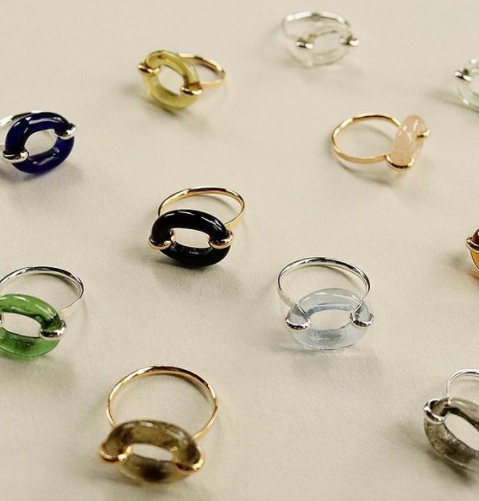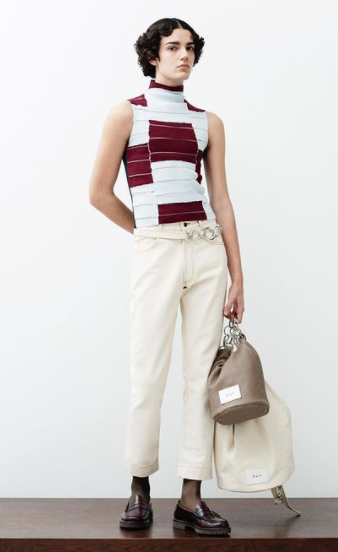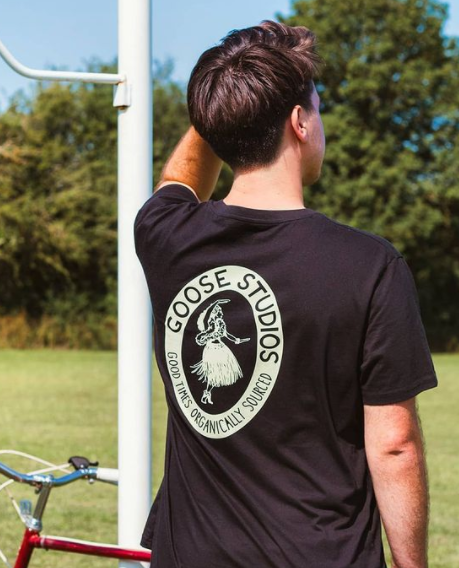The Haute Eco-Fashion Brand Spotlight
Article by Lucy Fordyce, with contributions by the Haute Writing Team
We need to talk about the fashion industry’s negative impact on the environment. In a time of dangerous climate change, when we are all becoming more aware of how textile manufacturing and disposal can be seriously damaging to our ecosystems, there are still over 92 million tons of clothing waste being produced globally every year.
92 million tons. You might feel like you can’t do anything to combat such a big number, but, as Tesco says, ‘Every little helps’. Even if our personal reduction of fashion waste is small, it still adds up to deliver real change. It shows the fashion industry that we want and need it to operate differently.
Some simple ways to make your wardrobe more environmentally friendly include: being less afraid of re-wearing outfits (no more “wear once and discard”), buying fewer but higher quality clothes that last longer, buying second-hand, and investing wherever you can in environmentally conscious companies, such as the brands listed here.
They all place a lot of emphasis on sustainability and ethical production whilst catering to a wide variety of aesthetics. As featured brand Goose Studios puts it, eco-friendly clothes can and should cover more styles than just ‘hemp ponchos [and] clothing ready for a day-off at Everest base-camp’ (but if super-natural fabrics and mountaineering gear are your jam, we’ve got some nice clothes to suit you too.) Read an introduction to each one below then check out their websites and IG pages!
Arcminute
@thearcminute
Arcminute focuses on quality, stand-out streetwear, from printed joggers to puffer coats that have been lab-tested to make sure they’ll keep you warm. The brand aims to support ‘people and organisations who are caring for our planet’ and £1 from every item sold on its website goes to the Arcminute Foundation, which supports community projects in Ghana.
BAM Bamboo Clothing
@bamboo_clothing
Bamboo was chosen as the main fabric for BAM’s products due to its softness, breathability, and eco-credentials. With its activewear, BAM hopes to be ‘impact positive’, meaning that its business practices will help the environment instead of harming it the way a lot of clothing production does.
CLED (suggested by Mia Furlong)
@cled
CLED makes the gems for its jewellery using reclaimed bottle waste from local restaurants and bars in the brand’s home city of Los Angeles. Traditional glass jewellery production is combined with modern fusion techniques to produce beautiful and durable pieces.
Colorful Standard
https://colorfulstandard.co.uk/
@colorfulstandard
Colorful Standard develops ‘pieces for the long run’. Think core unisex basics that will never go out of style, like t-shirts, beanies, and zip hoodies in organic cotton and Merino wool, sustainably produced in Portugal. There’s a colour to suit every wardrobe, from versatile Lava Grey to eye-catching Bubblegum Pink, and the entire range uses the same colour names so it’s easy to mix-and-match.
DANIEL w. FLETCHER (suggested by Mia Furlong)
@danielwfletcher
Each collection at DANIEL w. FLETCHER aims to tell a story, inspired by everything from British sporting heritage to American high school movies. Creative director Daniel, who recently competed on Netflix’s Next in Fashion, sees sustainability as a major concern for the fashion industry and frequently uses deadstock fabrics and British manufacturing in his designs.
Elvis & Kresse
https://www.elvisandkresse.com/
@elvisandkresse
The London Fire Brigade’s decommissioned water hoses are the star material for Elvis & Kresse’s luxury bags and accessories, which have so far saved over 200 tons of hose from disuse and raised considerable amounts of money for Fire Service charities. Elvis & Kresse has also partnered with Burberry to reduce leather waste by reworking the fashion house’s offcuts.
Frida Kharla
@fridakharla
https://www.etsy.com/uk/shop/FridaKharla
With help from Brazilian designers, Frida Kharla produces lazer-cut jewellery made of recycled rubber. The result is jewellery which is elaborate yet lightweight, aimed at showing ‘originality, authenticity, and personal growth’, as well as a touch of humour.
Gather & See
@gatherandsee
Gather & See was founded by two childhood friends who wanted to make it easier to shop sustainably and access ethical brands from around the world. Each stocked brand must fit with at least two of the retailer’s six Philosophies: Eco-Friendly, Heritage, Fair Trade, Organic, Small Scale Production, and Vegan. Customers can filter brands to shop by the Philosophy that they feel is most important.
Girlfriend Collective
@girlfriend
Girlfriend’s activewear is designed to be effective, size-inclusive, and stylish. It is produced from recycled fabrics which are cut/sewn in a SA8000 certified factory, meaning that fair wages and safe working conditions are upheld.
Goose Studios
@goose_studios
Goose Studios was founded to fill a gap for easily styled, everyday clothing in the eco-fashion community, what it describes as ‘throw-on and smile sustainable style’. Its collection includes organic cotton sweatshirts and t-shirts aimed at breaking down the affordability barrier that keeps many shoppers away from eco-fashion.
INKA
https://www.etsy.com/uk/shop/INKAFREE
@inka.free
This England- and Chile-based brand offers understated bohemian vibes, taking flowing silhouettes and raw or upcycled materials and making them super-wearable. Perfect for those days when you just want to chill in a low-effort, high-style dress or wrap yourself up in an oversized shawl.
Loud Bodies
@loudbodies
Loud Bodies was founded after Patricia Luiza Blaj was tired of finding only unflattering and dull clothes in her size. Frustratingly, many sustainable brands are not as size-inclusive as they should be, but Loud Bodies offers a great alternative, producing bold and bright pieces in sizes XXS to 7XL or to 10XL depending on the item. The brand also provides free of charge custom orders and uses its fabric offcuts to make pillows for dog shelters.
Lucy & Yak
@lucyandyak
Lucy & Yak started out making dungarees and has only grown from there. Manufacturing in both the UK and India, the brand is committed to supporting its employees and helping revive British textile craftsmanship through its cheerful, hardwearing designs made with organic and recycled fabrics.
Luna Del Pinal (suggested by Tom Kennedy)
@lunadelpinal
Offering bohemian luxury that recalls both the brand’s Spanish heritage and the Guatemalan textile techniques used to produce its pieces, Luna Del Pinal creates ‘destination-led artisanal womenswear’ for floaty beach vibes with a conscience. The brand helps over 200 workers earn fair pay for their craft and develop innovative styles based on traditional methods.
Ninety Percent
@ninety_percent
Ninety Percent is named after its business model of sharing 90% of its profits with charitable causes and those involved in the production process. The brand makes a point of ‘always selecting the most ethically considered options with the lowest environmental impact’ and designs clothes to transcend trends.
Oliver Spencer (suggested by Henry Empson)
@oliverspencer
Oliver Spencer aims to produce menswear that is ‘beneficial to the wearer, all those involved in making a garment, and our planet’, basing manufacturing in the UK and Portugal with trusted suppliers. A combination of quality construction and subdued tones ensure that Oliver Spencer pieces remain sturdy and stylish for years, reducing the negative environmental impact of frequently replacing clothes.
Tentree
@tentree
For every item purchased from Tentree, ten trees are planted, hence the name. Tentree believes that every small action to help the environment is important, from bringing a reusable bag to the supermarket to wearing clothes made from sustainable fabrics.
That’s Sew Maisie
@thatssewmaisie
Maisie Taylor’s key material is tulle, which she uses to create dramatic and fun designs that are perfect for festivals (whenever they make their grand return), photoshoots, or just looking fabulous when you pop to the shops. With the aim of creating ‘couture garments for everyone’ at a fair price point, each item is individually made to order so that there’s less material wastage.
Voya
@voya.official
Inspired by a love of travelling, Voya offers pieces that are designed to be easily worn on the go and eternally in style, made from luxury, sustainable fabrics such as recycled polyester, silk, organic cotton, and Merino wool. The brand collaborates with charities in the areas where its products are produced, supporting education programmes, donating garment samples to help clothe local people who are homeless, and offering its unused textiles to recycling mills.
Waste to Waist
@wastetowaist_
Waste to Waist’s name comes from the recycled polyester yarn used for its clothing, which is produced from post-consumer plastic waste. All Waste to Waist fabrics are sewn in the UK and are even sourced from a factory that’s only five minutes away from the brand’s production studio. Its designs are both on-trend and easy to style for daily wear or nights out.
Wolf & Badger
https://www.wolfandbadger.com/
@wolfandbadger
Wolf & Badger aims to create ‘a forward thinking global community built upon the age-old pillars of skill, craftsmanship and quality’, collating sustainable and ethical fashion, accessories, and homeware. The retailer has a Guarantee Index with symbols on product listings to show which positive business practices an item upholds, such as Metamorphosis (recycled materials), Share the Love (percentage of profits to charity), or Happy Worker (pays living wage, compliant with environmental regulations).
For even more ethical fashion inspiration, check out the original Haute Brand Spotlight, which focuses on promoting racial and ethnic diversity in design but also contains several super-sustainable brands!
Finally, some book recommendations because your writer is also an avid reader. If you’d like a funny, eye-opening, and realistic guide to engaging with fashion in a more sustainable way, check out Lauren Bravo’s How to Break Up with Fast Fashion. For a deep-dive into the topic, try Lucy Siegle’s To Die For: Is Fashion Wearing Out the World?























